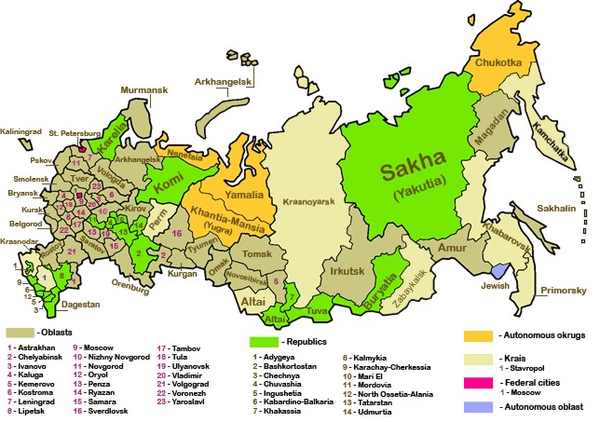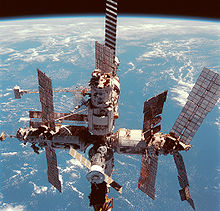 ALL OF YOUR BASE ARE BELONG TO RUSSIA
ALL OF YOUR BASE ARE BELONG TO RUSSIA Map of Russia
Map of Russia Brief/recent history
Brief/recent historyAside from the Russian empire and early years, one of it's empires shone above the rest. It was called the Soviet union. The Soviet Union (USSR) was a communist government that was eventually formed. One of it's most famous conflicts was in WW2 when it's former ally, national socialist Germany, invaded. The Russians pushed them out and back to Berlin and then proceeding to assrape the Germans. Another famous conflict of the USSR was the Cold War between the USSR and the remaining allied powers. It was not a war of guns or swords, but a war of technology. Both sides raced to have more intel and more nukes than the other side, which ended in the USSR eventually collapsing to form what is now the Russian Federation.
List of recent/famous conflicts- World War Two
- Cold War
- Russian invasion of Afghanistan
- Russo-Georgian war
Acomplishments
First man in space and to orbit the earth.

Space station Mir
MORE TO BE ADDED
Military The Russian military is divided into the Ground Forces, Navy, and Air Force. There are also three independent arms of service: Strategic Rocket Forces, Military Space Forces, and the Airborne Troops. In 2006, the military had 1.037 million personnel on active duty.[104] It is mandatory for all male citizens aged 18–27 to be drafted for a year of service in Armed Forces.[81]
The Russian military is divided into the Ground Forces, Navy, and Air Force. There are also three independent arms of service: Strategic Rocket Forces, Military Space Forces, and the Airborne Troops. In 2006, the military had 1.037 million personnel on active duty.[104] It is mandatory for all male citizens aged 18–27 to be drafted for a year of service in Armed Forces.[81]
Russia has the largest stockpile of nuclear weapons in the world. It has the second largest fleet of ballistic missile submarines and is the only country apart from the U.S. with a modern strategic bomber force.[20][105] Russia's tank force is the largest in the world, its surface navy and air force are among the largest ones.
The country has a large and fully indigenous arms industry, producing most of its own military equipment with only few types of weapons imported. Russia is the world's top supplier of arms, a spot it has held since 2001, accounting for around 30% of worldwide weapons sales and exporting weapons to about 80 countries.
Official government military spending for 2008 was $58 billion, the fifth largest in the world, though various sources have estimated Russia’s military expenditures to be considerably higher. Currently, a major equipment upgrade worth about $200 billion is on its way between 2006 and 2015.
(From wikipedia)
PoliticsAccording to the Constitution of Russia, the country is a federation and semi-presidential republic, wherein the President is the head of state and the Prime Minister is the head of government. The Russian Federation is fundamentally structured as a multi-party representative democracy, with the federal government composed of three branches:
Legislative: The bicameral Federal Assembly, made up of the 450-member State Duma and the 166-member Federation Council, adopts federal law, declares war, approves treaties, has the power of the purse and the power of impeachment of the President.
Executive: The President is the commander-in-chief of the military, can veto legislative bills before they become law, and appoints the Cabinet and other officers, who administer and enforce federal laws and policies.
Judiciary: The Constitutional Court, Supreme Court, Supreme Court of Arbitration and lower federal courts, whose judges are appointed by the Federation Council on the recommendation of the President, interpret laws and can overturn laws they deem unconstitutional.
The president is elected by popular vote for a six-year term (eligible for a second term, but not for a third consecutive term). Ministries of the government are composed of the Premier and his deputies, ministers, and selected other individuals; all are appointed by the President on the recommendation of the Prime Minister (whereas the appointment of the latter requires the consent of the State Duma). Leading political parties in Russia include United Russia, the Communist Party, the Liberal Democratic Party of Russia, and Fair Russia.
Western observers have raised questions as to how much of Russia's political system corresponds to Western liberal democratic ideals. Academics have often complained about the difficulty of classifying Russia's political system. According Steve White, during the Putin presidency Russia made clear that it had no intention of establishing a "second edition" of the American or British political system, but rather a system that was closer to Russia's own traditions and circumstances. Richard Sakwa wrote that the Russian government is undoubtedly considered legitimate by the great majority of the Russian people and seeks to deliver a set of public goods without appealing to extra-democratic logic to achieve them, but whether the system was becoming an illiberal or delegative democracy was more contentious.
(From Wikipedia)